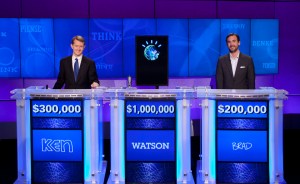
Sony Pictures Entertainment
Spoilers for last night’s finale of the Jeopardy IBM Challenge coming up:
Well, Homo sapiens, it was a great run. Two hundred thousand years! Yes, there was a war here and there and we caused a few extinctions and whatnot. But we developed language and mathematics, left crap on the ground that can be seen from space, and kicked the hell out of Homo neanderthalensis. Hold your heads high!
Humans’ primacy over the game of Jeopardy, at least, ended last night, as IBM’s Watson answered a Final Jeopardy question that put it on top with $77,147 to Ken Jennings’ $24,000 and Brad Rutter’s $21,600. Watson accepted victory stoically, as Jennings congratulated him on his answer board: “I, for one, welcome our new computer overlords.” See, there’s no computer that can craft a witty Simpsons reference! Probably because IBM hasn’t bothered to invent one yet.
So, fine, a computer outplayed us at Jeopardy. But there’s one thing humans can do better, and that’s point fingers. Or in this case, thumbs.
As flesh-partisans pointed out repeatedly over the three-night competition, Watson seemed to have an advantage in being able to “buzz in,” quickly and emotionlessly, while Jennings and Rutter stood frustrated, waiting for the nerve impulses to dawdle their way from their brains to their thumbs. (As described in a New York Times article, Watson can indeed buzz in within ten milliseconds when highly confident, but delays its buzz using a weighted scale when less confident.) Though we can’t know for certain, it usually seemed that all three contestants knew the correct response, and it all came down to speed.
But if it was all about the buzzing, then we have to ask: was this just a flaw in the Jeopardy IBM Challenge? Or did it highlight a flaw in Jeopardy itself? As Jennings and other veterans of the game have attested, buzzer speed and strategy, not raw knowledge, is what really separates the top players from one another. Once you’re at a certain level of the game, the best players will know a preponderance of responses: the trick is to buzz in quickly but not jump in before the trigger light, which then locks your buzzer out for crucial seconds.
In other words, Jeopardy looks like a trivia competition. But in reality, it’s thumb-wrestling for smart people. Tiddlywinks with a trivia component. That’s easy enough to ignore when you’re playing along at home and it’s human against human. But Watson made it too obvious.
How would you fix this problem, though? Build in some type of delay for Watson, and you’ll end up handicapping the game in favor of the human thumb. A truer test of trivia would simply be to have the contestants all answer questions, but you’d lose the strategy and wagering elements (not to mention, who would watch it?).
The best and fairest way to have a Jeopardy Challenge, in other words, would be not to have the contestants play Jeopardy. Trivial Pursuit, maybe?
OK, so maybe we humans can console ourselves that Watson essentially won a speed contest. (Also: it will never be able to love! &c.) And I have to wonder whether either Jennings or Rutter might have beaten it in a one-on-one match, without another higher primate splitting the questions that were buzzable by human thumbs.
But that doesn’t detract from the coolness of its accomplishment. I’ve seen some Watson-hateration out there to the effect that the machine is basically just a glorified database, or a calculator. Well, sure: if I could tell my calculator a story problem, or give Wikipedia a riddle-like query in figurative language and have it provide a correct answer. Watson may not “think” like a human, but its accomplishment is not as simple as looking up information that someone programmed it with; it’s knowing what information to retrieve, after deciphering complex language.
Which, by the way, is a human invention! And almost as important an invention as TV game shows. Someday, as we float suspended in vats of bio-gel, enjoying entertainments piped into our consciousnesses by the same computer network that feasts on our delicious brainwaves, I hope we remember those accomplishments proudly. We were really something, once.


